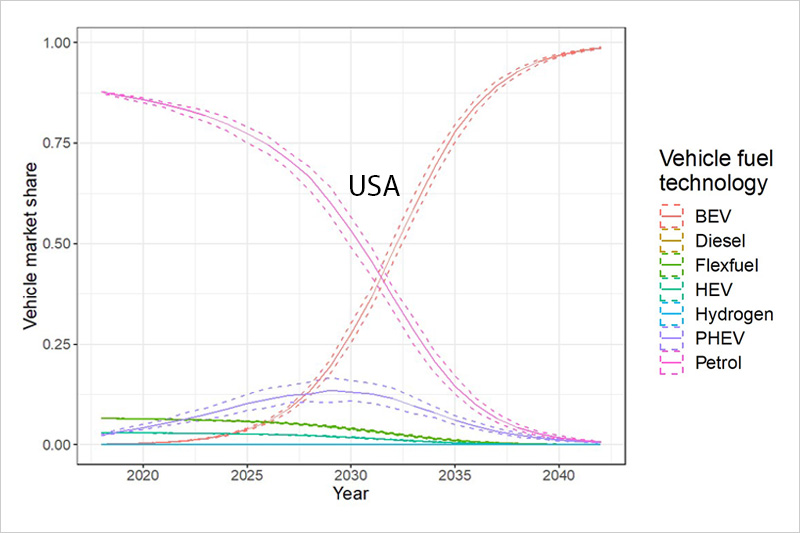
Accelerating Electric Vehicle Adoption for Sustainable Mobility
The global shift towards sustainable practices has led to a significant increase in the adoption of electric vehicles (EVs). As the automotive industry embraces this eco-friendly revolution, several factors contribute to the accelerated growth of EV adoption.
Environmental Impact of Electric Vehicles
One of the primary drivers behind the surge in electric vehicle adoption is the growing awareness of environmental issues. EVs produce fewer greenhouse gas emissions compared to traditional gasoline-powered vehicles, contributing to cleaner air and a reduced carbon footprint. As climate change concerns intensify, consumers are increasingly motivated to choose electric vehicles as a more environmentally friendly transportation option.
Advancements in Battery Technology
Continuous advancements in battery technology play a pivotal role in making electric vehicles more practical and appealing to consumers. Improved battery efficiency and range have alleviated concerns about the limited driving distance per charge, making EVs a viable option for daily commuting and longer journeys. As research and development efforts continue, we can expect further breakthroughs that will enhance the overall performance and affordability of electric vehicle batteries.
Government Incentives and Policies
Government initiatives and policies aimed at promoting sustainable practices have been instrumental in boosting electric vehicle adoption. Many countries offer financial incentives, tax credits, and subsidies for EV buyers, making these vehicles more economically attractive. Additionally, regulations mandating a transition to electric fleets in certain regions encourage both individual consumers and businesses to embrace electric vehicles as part of their transportation strategy.
Expanding Charging Infrastructure
A critical factor influencing the widespread adoption of electric vehicles is the development of a robust charging infrastructure. Governments and private companies are investing heavily in expanding charging networks, making it more convenient for EV owners to charge their vehicles. The proliferation of fast-charging stations along highways and in urban areas addresses the “range anxiety” concerns, providing reassurance to potential electric vehicle adopters.
Automaker Commitments to Electrification
Major automakers are increasingly committing to electrification, pledging to produce more electric models and phase out internal combustion engine vehicles. This shift in industry focus contributes to a broader range of electric vehicle options for consumers, catering to different preferences and needs. As more automakers embrace electric mobility, competition within the market is driving innovation and lowering the overall cost of electric vehicles.
Rising Consumer Awareness and Education
As consumers become more educated about the benefits of electric vehicles, there is a notable increase in interest and demand. Awareness campaigns, educational initiatives, and firsthand experiences shared by early adopters contribute to dispelling myths and misconceptions about electric vehicles. With access to accurate information, potential buyers are more likely to consider and choose electric vehicles as a viable and sustainable transportation solution.
Collaboration in the Energy Sector
The synergy between the automotive and energy sectors is crucial for the widespread adoption of electric vehicles. Collaboration between automakers, energy companies, and technology providers facilitates the integration of electric vehicles into the existing energy infrastructure. Smart charging solutions and renewable energy partnerships further enhance the sustainability of electric vehicles, creating a harmonious relationship between the transportation and energy sectors.
Technological Innovations in EV Features
Beyond environmental considerations, technological innovations in electric vehicles contribute to their appeal. Advanced features such as autonomous driving capabilities, enhanced connectivity, and integrated smart systems enhance the overall driving experience. These innovations not only attract tech-savvy consumers but also position electric vehicles as cutting-edge, high-performance alternatives to traditional vehicles.
Economic Benefits for Businesses
Businesses are increasingly recognizing the economic benefits of transitioning to electric fleets. Lower operating costs, reduced maintenance expenses, and a positive corporate image associated with sustainability are driving factors for businesses to integrate electric vehicles into their operations. As more companies adopt electric fleets, the cumulative impact on the environment and the economy becomes increasingly significant.
Challenges and Future Outlook
While the adoption of electric vehicles is on the rise, challenges such as charging infrastructure gaps, initial costs, and battery disposal must be addressed. However, with ongoing advancements and collective efforts from governments, industries, and consumers, the future of electric vehicle adoption looks promising. The continued momentum towards sustainable mobility heralds a new era in transportation, where electric vehicles play a central role in shaping a cleaner, greener future.
Explore the latest developments in Electric Vehicle Adoption here.


